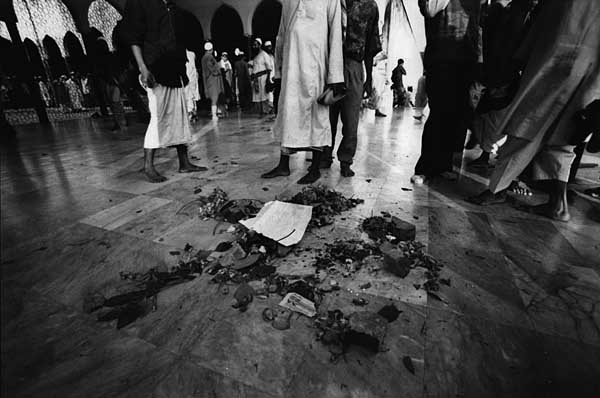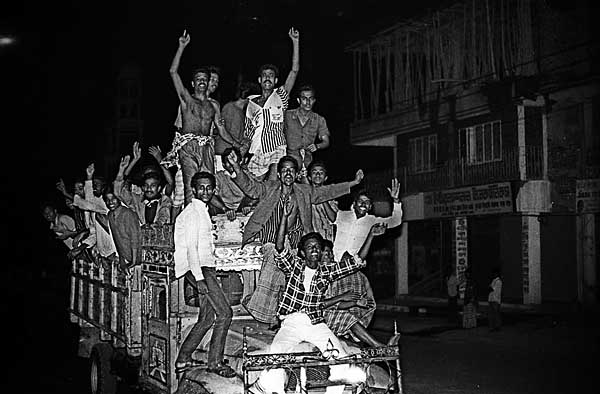![]()

?Come out we won’t shoot?, they had yelled out over the megaphone. Not the most alluring of invitations, particularly when it is from a police van surrounding your flat at midnight. They had thought we were hiding someone and after searching our rooftop had come into our flat. As they left, I had gone out to take pictures from our verandah. Rahnuma had turned up the television volume to hide the sound of the shutter on my Nikon 501, but it still seemed to make a very loud click. Luckily, I wasn?t noticed. It was the 2nd December 1990. Ershad?s autocratic government was feeling the heat. 
Two days earlier, after the Friday prayers, they had opened fire on the Baitul Mukarram mosque killing a man.
Lawyers had played an important role in our democracy movement. They had upheld writ petitions against the government, and when the government tried to flex its muscles, they came out in protest, united in their stand.

On this day, exactly sixteen years ago, barrister Shahjahan, Sarah Hossain and other lawyers were meant to meet at Drik. We were monitoring the government action, and were ourselves under scrutiny. My colleagues had warned me that plain clothed detectives were looking for me at the office. The detectives seemed to know we lived in Lalmatia, and my colleagues suggested that we stay elsewhere that night. Ma (Rahnuma?s mum), Rahnuma, Tehmina (a lawyer friend of ours) and I went over to Saif and Rini?s flat in Dhanmondi Rd 8. This was not the time for taking chances. The media too had played their role. When censorship became intolerable, they refused to publish. It was that night that Ershad had announced on television that he was going to step down. People were rejoicing in the streets. The following morning the first newspaper was out.


We all went out into the streets. Altaf on his motorbike, me on my bicycle, and the others in whatever transport they could find.

A little girl walked down Mirpur road with a bouquet of flowers in her hand. She too was celebrating the return of democracy. People were dancing in the streets. In Paltan, too often the scene of violence, people gathered in ones and twos.

Men and women in their sleeping clothes, some with children, gathered in the winter night. Chatpati wallas sensing a business opportunity appeared out of the fog. At about 1:30 am Shimul Billa, Bangladesh’s Shirley Temple, sang out ?Bichar poti tomar bichar korbe jara, aj jegeche ei jonota?.

The song ?O judge, the people have risen, it is now the day of your judgement?, was strangely prophetic.
And now in 2006, the chief justice of the supreme court intervenes to prevent a decision
going against a political party, lawyers ransack the court, a president with zero credibility heads a caretaker government, and of all people, Ershad himself is in the streets, demanding the removal of the current president, while Moudud, the chameleon survivor, then Ershad’s right hand man, now holds hands with the chief justice.
4th December 2006
Delhi
21 thoughts on “Judge on the docks”
Leave a Reply
You must be logged in to post a comment.

Amazing pictures.
Can almost smell the country.
I was 10 years old in 1990, it`s good to get a firsthand recollection of what had happened then through the lens of someone like you. thanks! keep up the great work 🙂
Anika
Shahidul Bhai,
Your work will be in our soul forever.
Carry on. You are the great.
Thanks.
Ahamed Fayzul Kabir
North Hollywood, CA, USA.
Excellent work 🙂 My prayers are with you and the country.
Ya Haqq!
especially we (new generations) get a another information,another history from you.thanks for that.really great
It?s a great job, you deserve thanks. I was very emotional to see all these and tried to memories those days. Actually I was closely involved with this movement as I was a student of Rajshahi University. Its very sad that our political leaders have lost their memories and forget straggles of 90s. Khaleda, Hasina, Aman ullah aman Khokon they were also on the street against Ershad regime. But now they all are trying to take Ershad on their side. I am not in politics after 16 years but still I can?t forget all those straggles. But our political leaders they are fine and they can share power together. The same way we have forget everything about our straggles of 71, Golam Azam, Nizami and share power with them. We have a tendency to forget our past but your work will help us to remind or recapitulate all those. Hope next generation will learn the facts from these. Thanks again.
I think we’ve lost our ethics. Can anybody answer how can we return back our ethics, our morality, our humanity….
Dear Mr Shahidul
One never know how lasting will be the impact of one’s work (deed) and how far will it go. Your work, committment and drik is something I really admire and this is one of the reasons I always wait for Shahidul News. This is something I always share with my fellow photgraphers and students of journalism and photography. Your spirit, your zeal remain, forever…we pray.
regards,
prabhat
Great pictures! I particularly like the one that shows the unity of the lawyers.
Sixteen years ago, we had brought down a dictator. With hindsight, we feel that we should also have thought about the dictator?s sidekicks and how they would reinvent themselves in the present. Today, when there is again a movement for democratic change, albeit with very different parameters, it is time to sing that song again. ?Bichar poti tomar bichar korbe jara, aj jegeche ei jonota?.
This time they must not get away with it.
I remember what a sense of achievement the December of 1990 brought to us. It was a few days of liberation from oppression and a step towards democracy and freedom. I could link it to 1971, when I was young and saw the expressions generated by Freedom on the faces of my parents. It reminded me off how my mother was asked to record ‘Amar Sonar Bangla’ on the spot and with no preparation. Both my parents ended upo singing and crying at the same time. This was broadcast by some international Radio. I looked on with total awe and amazement. In 1990 it was my turn to experience similar emotions.
What is the state of democracy in Bangladesh today?
Where are the citizens? Are we going to remain hostage in the hands of political parties? Why can’t we move freely and practice democracy at all levels of live, freedom of speech, expression, freedom of movement and the right to choose and not be dictated by party politics? I am purturbed, by these questions and the desire to see Bangladesh as we did December 1990 is always on my mind!
Can we claim our country back? Bangladesh is ours and it is not the private limited company of any party or group. Let us claim it back for our children, please!!
Dear Shohidul’bahi,
thanks a lot for reminding me tha happenings of that night. I came out of my house with my younger brother bare feet to join the spirit on the street and we stayed till the dawn. I can very well remember your face as you were on a Rikshaw heading towards Paltan. You didn’t much time to
were anything warm I suppose, a thin T-shirt, rubber-sandal and two Nikon hanging from your shoulders. It was a remarkable experience for me to see that face with the eyes of a desperate look of searching, as if you didn’t want to miss any single moment at that night. Those moments were in deed very very precious. But it is shameful to confess that most of us did fail to make the most out of that. And this is not the first time in the history of this nation.
How depressing the time now might be. Your images reminded me one of my most intensive experience. It makes me believe on something, that is gradually disappearing from my sight. These images motivates me to hope. After all we are the same people who were on the street at that night.
Take good care of yourself and Rehnuma’pa, even if you have to stay on the “edge” all the time.
I?ve been following your messages for a while and they just keep impressing me with the quality, honesty and bravery in them.
This one I think is very, very usefull, since often enough, politicians and social leaders that once where involved in freedom struggles, seem to later forget the spirit that drove a whole nation to make a change, almost always at the cost of many lives. We surrely need a report like yours here in M?xico.
Please forget my english!
FORTUNE
Rodolfo
?????-?? ??????? ????????!!!
????????????? ?????????? ? ?????????? ????? shahidul.wordpress.com ))))
??? ?? ?????? ?????? ???? ??????!
shahidul.wordpress.com – the best site
Good night
I think it wasnt easy to post here so much information.
Best Regards
Dolly
Very useful and informative blog. Recommended for all to see.
http://medsdrugs.blogspot.com/
Hello! Help solve the problem.
Very often try to enter the site, but says that the password is not correct.
Regrettably use of remembering. Give like to be?
Thank you!
Helo, it is very interesting site. If You want you can visit mine. chain does hang low lyric I have make it myself. There you can find all about chain does hang low lyric etc…
[b]???? ??????!!![/b]
???? ? ??? ???? ????? ?????? ? ???????????? ??????????, ? ????? ??????? ????????, ??????????? ? ??????????, ??? ? ??. ?. ???????????!
[b]???.: (495) 939-44-89[/b] [b]???????!!![/b]
??????????!!!